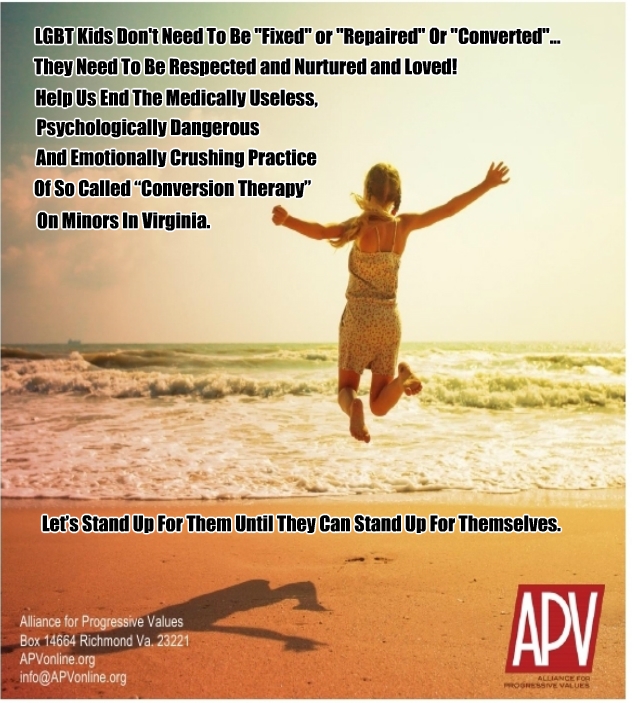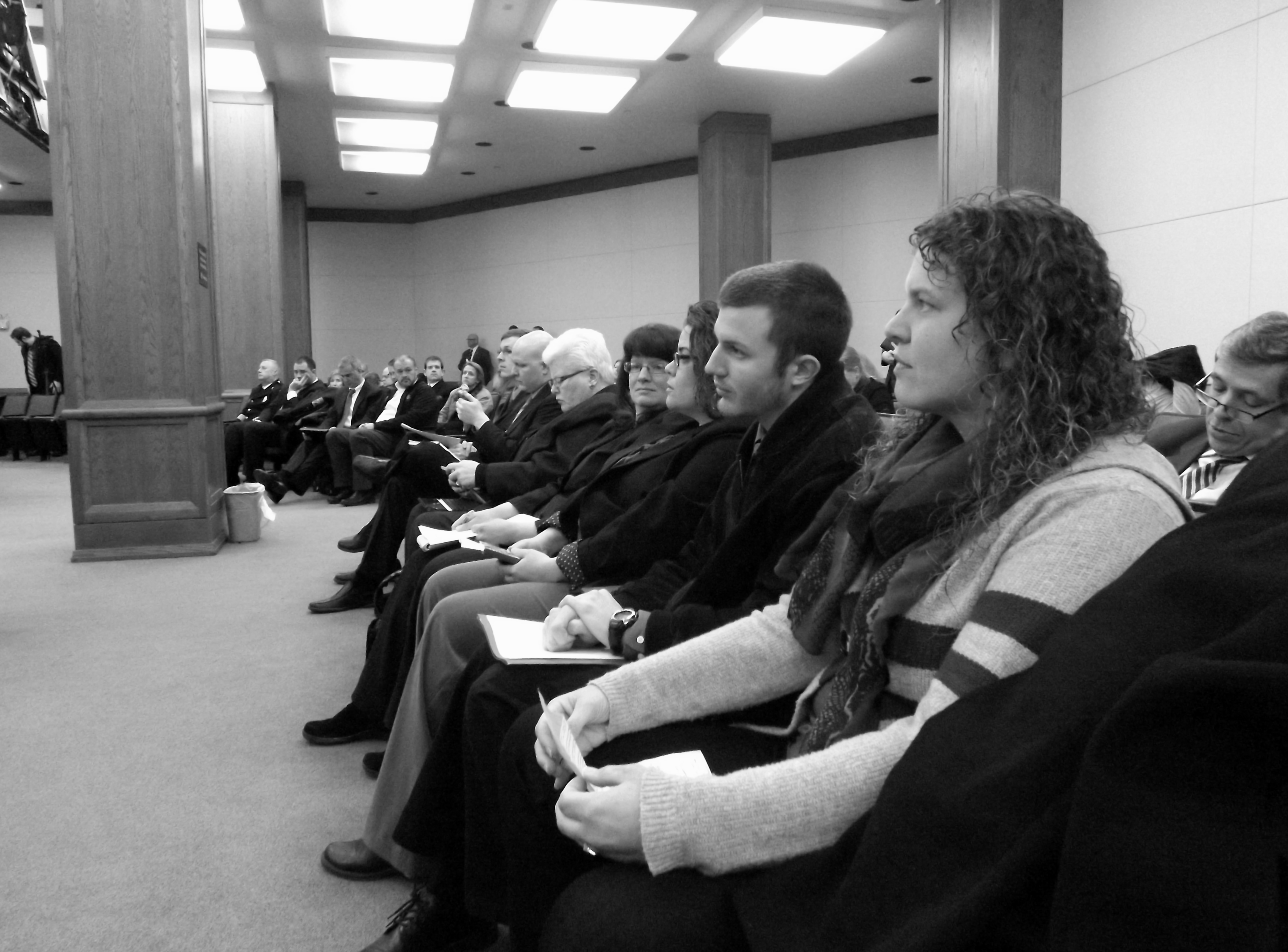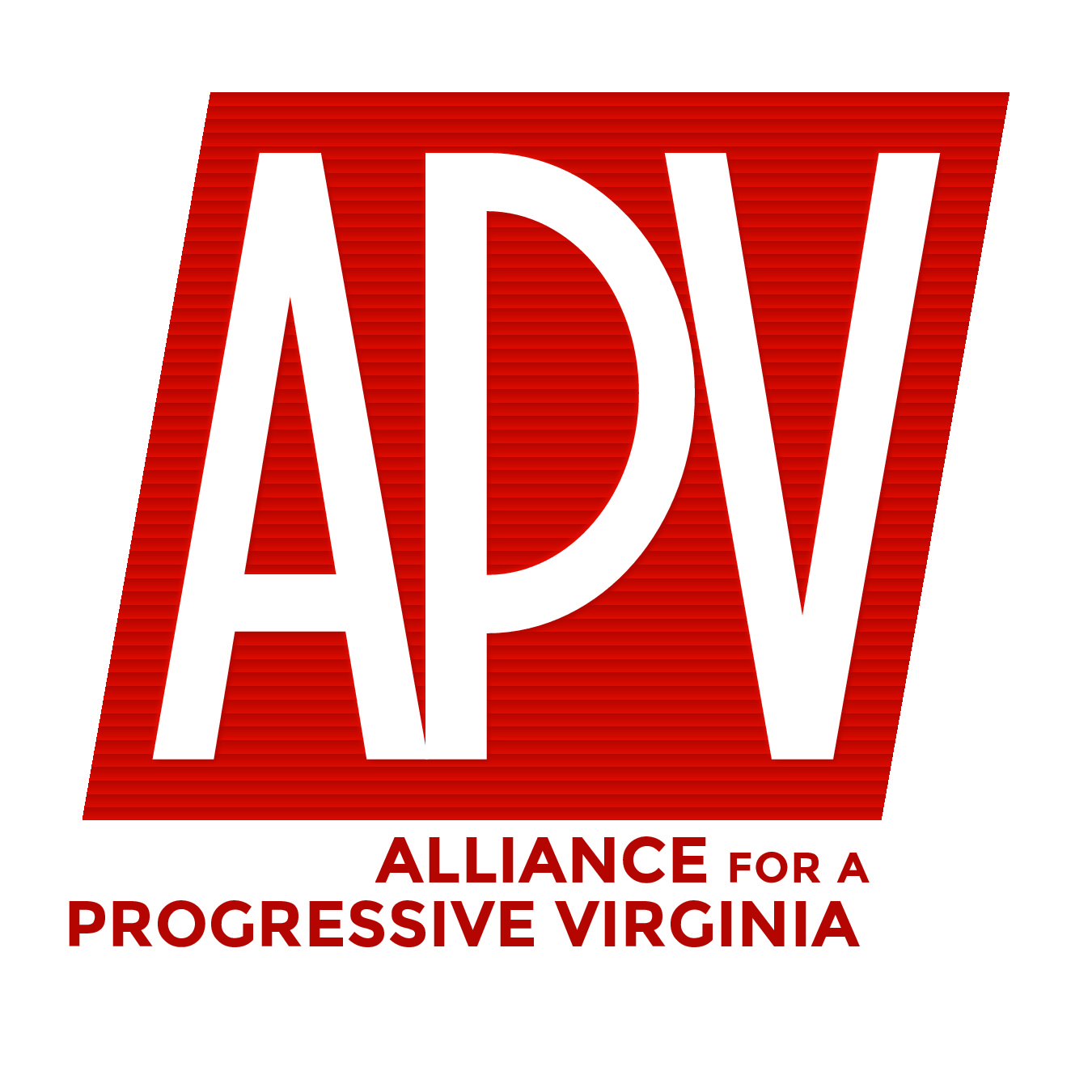
We Don’t Need to “Cure” LGBT Kids, We Need to Nurture, Respect and Love Them.
January 10, 2016
APV is part of a large coalition of national, regional and local organizations who have worked for the past three years to end the practice of Conversion Therapy on children in the Commonwealth of Virginia.
This year at our request, Delegate Patrick Hope of Arlington and Senator Scott Surovell of Mount Vernon have introduced companion legislation, HB 427 and SB 262 in the Virginia House of Delegates and the Senate respectively that will ban the use of so called “Conversion Therapy” on minors in the Commonwealth. We would also like to thank Senator Rosalyn Dance who has introduced a version of this legislation, SB267
Conversion Therapy has been thoroughly discredited and denounced by the medical/clinical community and has been shown to cause serious psychological and emotional damage, in particular to children. It’s an unethical and unfounded practice that begins with the premise that LGBT children are broken and that they can be “repaired,” through “therapy” that can include such pointless activities as participating in more “gender appropriate behavior,” and forming a forced aversion to the same sex. Anxiety and depression are exacerbated to dangerous levels because of the actions and methodologies of these mental health professionals.
HB 427 and SB 262 will prevent the practice of Conversion Therapy by anyone holding a state approved license in fields such as psychology, social work and family counseling. While our bill does not infringe on the practice of religion, the choices of adults, or needlessly interfere with the relationship between parents and children, it does remove the veneer of science and medicine that is often used to mask these cruel and dangerous practices.
We owe it to LGBT children to stand up for them, until they can stand up for themselves.
As of June 2016, our bills remain in limbo after being referred to the General Assembly’s Code Commission at the end of the current session for further study. At present we are seeking out other avenues to address this issue and we will not quit until these children are safe.
More information about the issue is available here
_____________________________________________

Witnesses wait to testify in Subcommittee, January 2014.
______________________________________________
If you are an individual who has undergone Conversion Therapy, especially as a minor, your testimony is important! Please contact us.
Contact info for APV:
LGBT Deputy Policy Director
Apryl Prentiss, APrentiss@APVonline.org
(757) 6369745
Press Inquiries:
APV Public Policy Director
Victoria Bragunier, VBragunier@APVonline.org
(804) 517-5206
Contact Information for Members of the House Committee on General Laws: HB 427
Gilbert (Chairman), Albo, Wright, Peace, Anderson, Greason, Knight, LeMunyon, Helsel,
Robinson, Yost, Hodges, Bell, Richard P.,Minchew, Leftwich, Ward, Bulova, Carr, Torian, McQuinn, Hester, Aird
Contact Information for Members of the Senate Committee on Education and Health: SB 262
Newman (Chairman), Saslaw, Lucas, Howell, Locke, Barker, Black, Carrico, Garrett, Petersen,
Cosgrove, Lewis, Dunnavant, Chase Suetterlein
Here is a sample email or phone message (Remember, always be polite):
Dear
I ask that you support HB 427 SB 262, legislation to end the practice of “Conversion Therapy” on minors in Virginia, presently before the legislature. Conversion therapy is the non-scientific, non-medical, and unsafe attempt to change the sexual orientation or gender identity of children and adults from Lesbian, Gay, Bisexual or Transgender to Heterosexual. It is the consensus of the medical/clinical community that conversion therapy does not work and is in fact dangerous, particularly to children. Please consider signing on as a co-patron of and voting for HB 427 SB 262.
Yours Truly:
Organizational Positions on Reparative Therapy
American Academy of Child Adolescent Psychiatry
“Clinicians should be aware that there is no evidence that sexual orientation can be altered through therapy, and that attempts to do so may be harmful. There is no empirical evidence adult homosexuality can be prevented if gender nonconforming children are influenced to be more gender conforming. Indeed, there is no medically valid basis for attempting to prevent homosexuality, which is not an illness. On the contrary, such efforts may encourage family rejection and undermine self-esteem, connectedness and caring, important protective factors against suicidal ideation and attempts. Given that there is no evidence that efforts to alter sexual orientation are effective, beneficial or necessary, and the possibility that they carry the risk of significant harm, such interventions are contraindicated.”
Practice Parameter on Gay, Lesbian, or Bisexual Orientation, Gender Nonconformity, and Gender Discordance in Children and Adolescents.
American Academy of Pediatrics
“Confusion about sexual orientation is not unusual during adolescence. Counseling may be helpful for young people who are uncertain about their sexual orientation or for those who are uncertain about how to express their sexuality and might profit from an attempt at clarification through a counseling or psychotherapeutic initiative. Therapy directed specifically at changing sexual orientation is contraindicated, since it can provoke guilt and anxiety while having little or no potential for achieving changes in orientation.”
Homosexuality and Adolescence, Pediatrics.
American Association for Marriage and Family Therapy
“[T]he association does not consider homosexuality a disorder that requires treatment, and as such, we see no basis for [reparative therapy]. AAMFT expects its members to practice based on the best research and clinical evidence available.”
AAMFT Position on Couples and Families.
American College of Physicians
“The College opposes the use of “conversion,” “reorientation,” or “reparative” therapy for the treatment of LGBT persons.”
American Counseling Association
“The belief that same-sex attraction and behavior is abnormal and in need of treatment is in opposition to the position taken by national mental health organizations, including ACA. The ACA Governing Council passed a resolution in 1998 with respect to sexual orientation and mental health. This resolution specifically notes that ACA opposes portrayals of lesbian, gay and bisexual individuals as mentally ill due to their sexual orientation. . . . In 1999, the Governing Council adopted a statement ‘opposing the promotion of reparative therapy as a cure for individuals who are homosexual.’ . . .
[T]he ACA Ethics Committee strongly suggests that ethical professional counselors do not refer clients to someone who engages in conversion therapy or, if they do so, to proceed cautiously only when they are certain that the referral counselor fully informs clients of the unproven nature of the treatment and the potential risks and takes steps to minimize harm to clients. . . . This information also must be included in written informed consent material by those counselors who offer conversion therapy despite ACA’s position and the Ethics Committee’s statement in opposition to the treatment. To do otherwise violates the spirit and specifics of the ACA Code of Ethics.”
Ethical Issues Related to Conversion or Reparative Therapy.
American Medical Association
“Our AMA… opposes, the use of ‘reparative’ or ‘conversion’ therapy that is based upon the assumption that homosexuality per se is a mental disorder or based upon the a priori assumption that the patient should change his/her homosexual orientation.”
H-160.991, Health Care Needs of the Homosexual Population.
American Psychiatric Association
“Psychotherapeutic modalities to convert or ‘repair’ homosexuality are based on developmental theories whose scientific validity is questionable. Furthermore, anecdotal reports of “cures” are counterbalanced by anecdotal claims of psychological harm. In the last four decades, “reparative” therapists have not produced any rigorous scientific research to substantiate their claims of cure. Until there is such research available, [the American Psychiatric Association] recommends that ethical practitioners refrain from attempts to change individuals’ sexual orientation, keeping in mind the medical dictum to first, do no harm.
The potential risks of reparative therapy are great, including depression, anxiety and self-destructive behavior, since therapist alignment with societal prejudices against homosexuality may reinforce self-hatred already experienced by the patient. Many patients who have undergone reparative therapy relate that they were inaccurately told that homosexuals are lonely, unhappy individuals who never achieve acceptance or satisfaction. The possibility that the person might achieve happiness and satisfying interpersonal relationships as a gay man or lesbian is not presented, nor are alternative approaches to dealing with the effects of societal stigmatization discussed.
Therefore, the American Psychiatric Association opposes any psychiatric treatment, such as reparative or conversion therapy which is based upon the assumption that homosexuality per se is a mental disorder or based upon the a priori assumption that the patient should change his/her sexual homosexual orientation.”
Position Statement on Therapies Focused on Attempts to Change Sexual Orientation (Reparative or Conversion Therapies).
American Psychoanalytic Association
“As with any societal prejudice, bias against individuals based on actual or perceived sexual orientation, gender identity or gender expression negatively affects mental health, contributing to an enduring sense of stigma and pervasive self-criticism through the internalization of such prejudice.
Psychoanalytic technique does not encompass purposeful attempts to ‘convert,’ “repair,” change or shift an individual’s sexual orientation, gender identity or gender expression. Such directed efforts are against fundamental principles of psychoanalytic treatment and often result in substantial psychological pain by reinforcing damaging internalized attitudes.”
Position Statement on Attempts to Change Sexual Orientation, Gender Identity, or Gender Expression.
American Psychological Association
“THEREFORE, BE IT RESOLVED, That the American Psychological Association affirms that same-sex sexual and romantic attractions, feelings, and behaviors are normal and positive variations of human sexuality regardless of sexual orientation identity;
BE IT FURTHER RESOLVED, That the American Psychological Association reaffirms its position that homosexuality per se is not a mental disorder and opposes portrayals of sexual minority youths and adults as mentally ill due to their sexual orientation;
BE IT FURTHER RESOLVED, That the American Psychological Association concludes that there is insufficient evidence to support the use of psychological interventions to change sexual orientation;
BE IT FURTHER RESOLVED, That the American Psychological Association encourages mental health professionals to avoid misrepresenting the efficacy of sexual orientation change efforts by promoting or promising change in sexual orientation when providing assistance to individuals distressed by their own or others’ sexual orientation…”
Resolution on Appropriate Affirmative Responses to Sexual Orientation Distress and Change Efforts.
American School Counselor Association
“Lesbian, gay, bisexual, transgendered and questioning (LGBTQ) youth often begin to experience self-identification during their pre-adolescent or adolescent years, as do heterosexual youth. These developmental processes are essential cognitive, emotional and social activities, and although they may have an impact on student development and achievement, they are not a sign of illness, mental disorder or emotional problems nor do they necessarily signify sexual activity.
The professional school counselor works with all students through the stages of identity development and understands this development may be more difficult for LGBTQ youth. It is not the role of the professional school counselor to attempt to change a student’s sexual orientation/gender identity but instead to provide support to LGBTQ students to promote student achievement and personal well-being.”
The Professional School Counselor and LGBTQ Youth.
American School Health Association
“[T]he American School Health Association . . . expects that comprehensive sexuality education in schools will be scientifically accurate and based on current medical, psychological, pedagogical, educational and social research . . . [and recommends] that teachers be well-trained and competent to teach sexuality education as defined by . . . insight into and acceptance of their own personal feelings and attitudes concerning sexuality topics so personal life experiences do not intrude inappropriately into the educational experience.”
Quality Comprehensive Sexuality Education.
National Association of Social Workers
“People seek mental health services for many reasons. Accordingly, it is fair to assert that lesbians and gay men seek therapy for the same reasons that heterosexual people do. However, the increase in media campaigns, often coupled with coercive messages from family and community members, has created an environment in which lesbians and gay men often are pressured to seek reparative or conversion therapies, which cannot and will not change sexual orientation. Aligned with the American Psychological Association’s (1997) position, NCLGB [NASW’s National Committee on Lesbian and Gay Issues] believes that such treatment potentially can lead to severe emotional damage. Specifically, transformational ministries are fueled by stigmatization of lesbians and gay men, which in turn produces the social climate that pressures some people to seek change in sexual orientation. No data demonstrate that reparative or conversion therapies are effective, and in fact they may be harmful.”
Position Statement, “Reparative” and “Conversion” Therapies.
Pan American Health Organization (PAHO): Regional Office of the World Health Organization
Services that purport to “cure” people with non-heterosexual sexual orientation lack medical justification and represent a serious threat to the health and well-being of affected people, the Pan American Health Organization (PAHO) said in a position statement launched on 17 May, 2012, the International Day against Homophobia. The statement calls on governments, academic institutions, professional associations and the media to expose these practices and to promote respect for diversity.
Statement, “Therapies” to change sexual orientation lack medical justification and threaten health.
Just the Facts Coalition (American Academy of Pediatrics, American Association of School Administrators, American Counseling Association, American Federation of Teachers, American Psychological Association, American School Counselor Association, American School Health Association, Interfaith Alliance Foundation, National Association of School Psychologists, National Association of Secondary School Principals, National Association of Social Workers, national Education Association, School Social Work Association of America)
“The most important fact about ‘reparative therapy,’ also sometimes known as ‘conversion’ therapy, is that it is based on an understanding of homosexuality that has been rejected by all the major health and mental health professions. The American Academy of Pediatrics, the American Counseling Association, the American Psychiatric Association, the American Psychological Association, the National Association of School Psychologists, and the National Association of Social Workers, together representing more than 477,000 health and mental health professionals, have all taken the position that homosexuality is not a mental disorder and thus there is no need for a ‘cure.’”
Just the Facts About Sexual Orientation and Youth: A Primer for Principals, Educators, and School Personnel.
Press From 2015:
The controversy continues:
From the Richmond Times Dispatch
More onConversion Therapy and our work to end it in Virginia from last year:
From The Richmond Times Dispatch
_______________________________________________________
